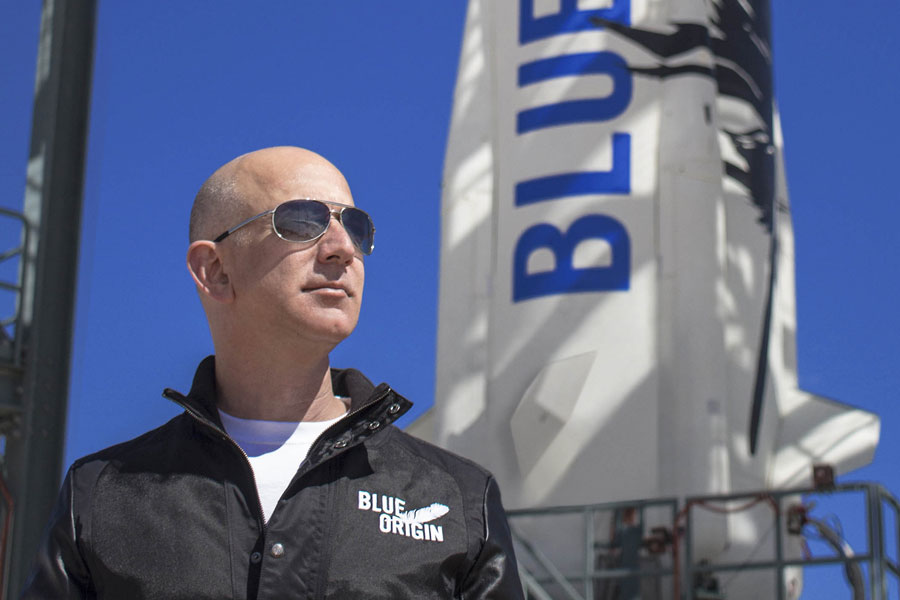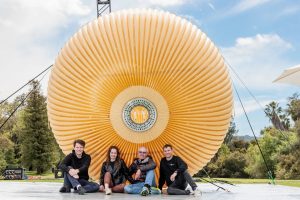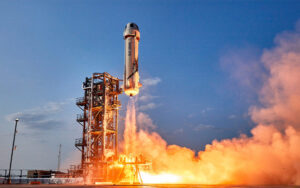Blue Origin vs SpaceX: the Hard Race to Space Leadership
19th Apr 2022
Space achievements of the 21st century are inextricably linked with the names of Jeff Bezos and Elon Musk in their Blue Origin vs SpaceX private race competition. Thanks to the rivalry between the two richest people on the planet, in the last few years, humanity has seen more success in the conquest of black matter than it did in the past 20 years. Today, SpaceX and Blue Origin continue to lead the way in private space and inspire dozens of new startups to join the space race. Orbital Today has collected a chronicle of the confrontation between the two “sworn enemies” and tried to answer the question of which is better SpaceX or Blue Origin.
Fateful dinner
Blue Origin and SpaceX founders entered the space industry at almost the same time but came from different backgrounds. Both started companies with their own funds, but Blue Origin founder Bezos had a head start in time and finances. By the time Blue Origin was created in 2000, Amazon had already earned him several billion. SpaceX came about two years later when Musk successfully sold PayPal for $160 million.
The Blue Origin vs SpaceX confrontation began in 2004 at their owners’ dinner. Blue Origin founder Bezos offered Musk some of his, as it seemed to him, original ideas, but SpaceX founder rudely rejected them. “I told him: Buddy, we tried, but it didn’t work out. Don’t repeat our mistakes! I really did my best to give him good advice, but he mostly ignored it,” SpaceX founder Musk recalls in Christian Davenport’s Space Barons.
Since then, the Blue Origin and SpaceX owners do not get along with each other. This Blue Origin vs SpaceX confrontation manifests itself in almost everything, from public criticism to lawsuits. However, it does not prevent Blue Origin and SpaceX from methodically moving toward their goals. But how do the goals and approaches of Blue Origin and SpaceX differ? How are the chosen methods working at Blue Origin and SpaceX approaches?
Turtle vs Hare: The difference between SpaceX and Blue Origin strategy
Gradatim Ferociter
Jeff Bezos is betting on space tourism. A conservative by nature, in business, he is guided by a smooth development tactic based on the old military adage: “slow is smooth, smooth is fast.” Blue Origin’s motto, Gradatim Ferociter, is Latin for “step by step, ferociously”. After each successful launch, a tortoise is drawn on board the Blue Origin New Shepard rocket, which is a reference to Aesop’s fable about the Tortoise overtaking the Hare.
“The long-term goal of our small team,” says Blue Origin founder, “is to find a way for a person to gradually get used to outer space. We will achieve it slowly, step after step. Be turtles, not hares, and spend resources wisely.”
So, is Blue Origin’s turtle better than SpaceX’ hare, you ask? It could be probably, but the answer to the is Blue Origin better than SpaceX question is not that easy in practice.
The turtle’s pace made New Shepard Blue Origin’s only real achievement in 20 years. A suborbital booster with a cargo-passenger capsule starts vertically and rises to a height of 100 km, allowing passengers to experience weightlessness and enjoy the beauty of Earth from space through panoramic windows. The first Blue Origin New Shepard flight with people took place only last year, but Jeff Bezos plans to make such trips regular in the future.
New Shepard technology has a high level of safety and comfort; however, it is not without flaws. The Blue Origin flight lasts only 11 minutes, and passengers spend only three of those minutes in zero gravity. The cost of tickets has not yet been announced; however, it is expected to be at least $200,000 – something not everyone can afford. Of course, being in space, even if only in sub orbit, is an inspiring and rewarding experience, especially for future astronauts, but will it be as popular as Blue Origin’s founder expects it to be?
To be fair, New Shepard isn’t Blue Origin’s only development. There are others – the New Glenn heavy orbital launch vehicle and the Blue Moon lunar lander. However, it will take a while before those developments become operational, and it is still a big question if these vehicles will be able to compete with the current spacecraft.
Work tirelessly
Unlike the conservative Bezos, Musk has adopted an aggressive tactic for SpaceX to gain attention through risky innovation. SpaceX started developing launch vehicles that could significantly reduce the cost of launching payloads into orbit and bring the possibility of colonising other planets, in particular Mars, Musk’s childhood dream.
SpaceX’s strategy of working tirelessly helped to quickly earn the trust of the government and business, attracting multibillion-dollar venture capital investments and securing large government contracts for SpaceX. Even though the first SpaceX effort failed in 2006, when the first sample of the SpaceX Falcon One rocket crashed during testing, four months later, SpaceX won the NASA contract under the Commercial Orbital Transportation Services program and received a total funding of $400 million for the development of the launch vehicle Falcon 9 and Dragon ship.
It took just two years for SpaceX to work out the bugs and successfully launch a Falcon 1 payload into orbit, and two more to enter the market with the SpaceX Falcon 9 and the Dragon cargo ship to deliver payloads to the ISS. This gave SpaceX access not only to contracts with NASA but also with the US Air Force. Later, modifications of the SpaceX Falcon Heavy (super-heavy launch vehicle) and the passenger ship Crew Dragon were developed.
Blue Origin vs SpaceX: which is ahead?
Today, SpaceX Falcon 9 makes more launches per year than any other launch vehicle in the world, and the cost of putting a one-kg payload into orbit on it is the lowest in the world. This was made possible thanks to the high payload capacity to LEO (23 tons) and the reusable first-stage technology. As a reminder, Blue Origin New Shepard also supports reusable launch technology; however, on a Blue Origin rocket vs SpaceX scale, it clearly loses.
The same applies to the number of employees in both companies. People working at Blue Origin are three times fewer than in SpaceX – despite Bezos’ repeated attempts to attract some competitor professionals with higher salaries.
Blue Origin fails to catch on to NASA’s Artemis lunar program, too. The US government deemed SpaceX developments more suitable for moon colonisation, and the court dismissed Blue Origin’s lawsuit in an attempt to appeal the decision.
Perhaps, the most triumphant victory of Space X vs. Blue Origin became mission Inspiration 4. On 16th September 2021, just three months after New Shepard’s first passenger flight, SpaceX launched its own amateur astronauts into space. Crew Dragon passengers spent three whole days in orbit and could enjoy panoramic views of space and the Earth through a glass dome, specially equipped in the bow of the Crew Dragon, which was much larger than Blue Origin New Shepard’s panoramic windows. That is, Musk has practically beaten Bezos in his field – the space tourism niche.
And yet, SpaceX had another ace up its sleeve. This is a fully reusable heavy orbital spacecraft Starship with the HLS (Human Landing System) modification. This is the vehicle SpaceX founder is building for Moon and Mars colonisation, and judging by how methodically he moves towards this goal, crushing all the competitors around, we will soon see Starship in real action.
And then Jeff Bezos will have to oppose something much more serious than the 6-seater New Shepard, landing on parachutes in an old-fashioned way. Well, let’s wait and see before we answer the “Blue Origin vs SpaceX which is better” question. Stay with Orbital Today, all the Blue Origin vs SpaceX fun is just getting started!






Thank you for your comment! It will be visible on the site after moderation.